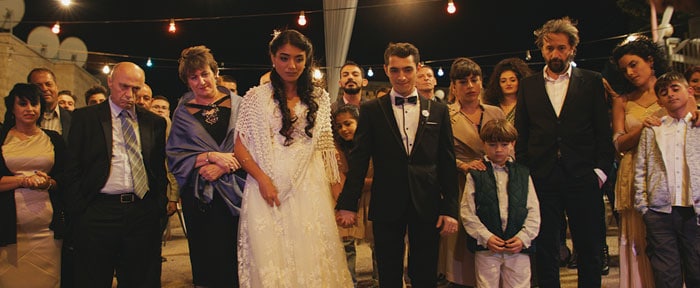 A scene from “Let It Be Morning”
A scene from “Let It Be Morning” Say what you will about Israeli filmmakers, you can’t accuse them of pulling their punches or avoiding sensitive subjects.
On the contrary, they seem to revel in topics bound to upset a large proportions of their countrymen and women—including government officials—that would give pause to their Hollywood colleagues.
This year, Israeli films are vying for the golden statuettes in two categories — best international (foreign language) entries and best documentary movie.
The Journal discussed the latter film, “Love It Was Not” by Israeli director Maya Sarfaty in its Oct. 27 issue. The plot revolves around the still touchy emotional topic of a romance between a Jewish woman imprisoned in Auschwitz and an SS officer working in the death camp’s administration.
For the country’s official entry in the foreign language category, the Israeli Film Academy Academy chose an even more controversial topic, the treatment of Palestinians on the West Bank by Israeli authorities, as told from the Arab perspective.
“Let It Be Morning”, with an all-Palestinian cast, was written and directed by one of Israel’s top Jewish directors, Eran Kolirin, who previously helmed the highly successful “The Band’s Visit” which morphed into a hit Broadway play.
The movie, based on the novel of the same tile by Sayed Kashua, revolves around two brothers, both citizens of Israel, who live in different towns.
One brother travels to the other’s town to attend his wedding. After the festivities, as he prepares to return to his home and family, he learns that in the intervening few days Israeli authorities have put his brother’s village on lockdown and blocked the road leading back to his hometown.
The film dominated this year’s Ophir Awards, Israel’s equivalent to the Academy Awards, which also garnered top honors for best director, screenplay, actor, actress and best supporting actors.
During a Los Angeles press screening of the film at the Pacific Design Center, director Kolirin was joined in a Q&A session by David N. Myers, a UCLA professor of Jewish history and prominent peace activist, followed by separate interviews with the Jewish Journal.
Kolirin explained the title of the film and the novel on which it is based as representing “a sort of yearning that will shine a new light on this unbearable situation and the hope of an awakening from this darkness.”
In the past, some Israeli politicians have criticized the nation’s filmmakers for movies that showed unflattering aspects of the country abroad, to which Kolirin responded that “our films may represent a different kind of Israel, but you can’t say THIS is Israel and THAT is Israel.
“Our film deals with a very humane subject, so I believe that people who loved ‘The Band’s Visit’ will find themselves loving ‘Let It Be Morning.’”-Eran Kolirin
“Our film deals with a very humane subject, so I believe that people who loved ‘The Band’s Visit’ will find themselves loving ‘Let It Be Morning’.”
Myers summarised the film as a “a very powerful articulation of the lives of Palestinians living under Israeli law.” He also noted Kolirin’s observation that in making the film the director had in mind the works of novelist Franz Kafka, the chronicler of modern man’s alienation and anxiety.
In any case, Myers added, “Art is intended to challenge and subvert.”
The Israeli film is competing with entries from 92 other countries and was probably not helped by the absence of the Palestinian cast members from the Israel award ceremony and the prestigious Cannes Film Festival. Their grievance was that the film should have been submitted to the American Academy Awards and the Cannes Film Festival as a “Palestinian” rather than and “Israeli” film.
Given the film’s all-Palestinian locale and cast, they may have a point though, ironically, the making of the film was heavily subsidised by the Israel Film Fund, controlled by an arm of the Israeli government.
Responding to a question, director Kolirin said that the Israel Fund contributed $500,000 to the film’s overall cost of of $1,500,000.
The other entry by an Israeli filmmaker, Maya Safaty’s “Love It Was Not,” faces even stiffer competition in the Documentary Feature category, which lists 238 entries,
The Academy’s shortlists of 15 nominees for each category will be released on Feb. 9 of next year, and the 94th Academy Awards, with heir emotional thank-you speeches by the winners, will be held March 27 — pandemic permitting — and broadcast worldwide.
“Let It Be Morning” will screen at the Chinese Theatre in Hollywood from Dec.8 – 14, with tickets from $12 to $15. Tickets can be purchased in person at the box office or online at: https://tickets.tclchinesetheatres.com/Browsing/Movies/Details/h-HO00000221





















 More news and opinions than at a Shabbat dinner, right in your inbox.
More news and opinions than at a Shabbat dinner, right in your inbox.